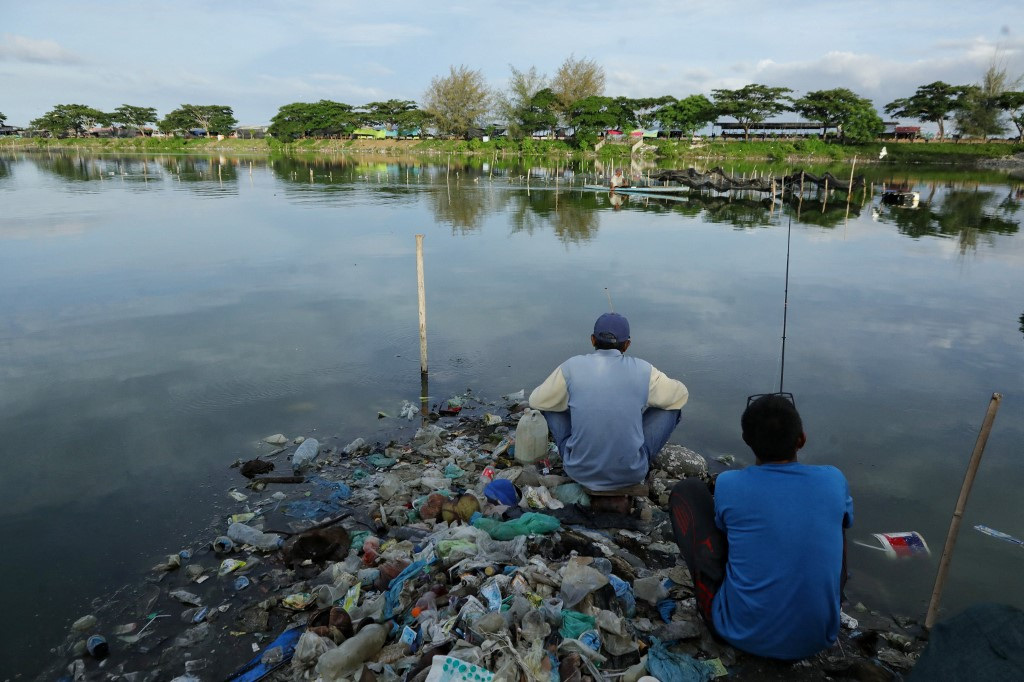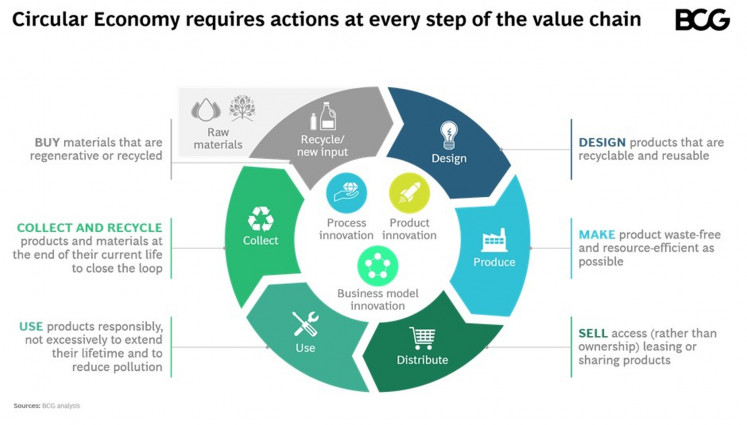Popular Reads
Top Results
Can't find what you're looking for?
View all search resultsPopular Reads
Top Results
Can't find what you're looking for?
View all search resultsCircular economy practices must be scaled to answer our plastic pollution problem
Our intensive reliance on plastic has created an Age of Disposables — turning this essential material into a scourge of modern society.
Change text size
Gift Premium Articles
to Anyone
P
lastics have been a major driver of human progress over the last century. This diverse group of materials has evolved to underpin our modern world with numerous applications that make our daily lives more comfortable.
Our intensive reliance on plastic has created an Age of Disposables — turning this essential material into a scourge of modern society. Over 9 billion tons of plastic have been produced since 1950, with more than half ending up in landfills or polluting ecosystems around the world. Less than 7 percent of plastics produced over the last seven decades have been recycled. Of that number, more than two-thirds ultimately ends up incinerated or as waste.
The problem of plastic pollution is particularly acute in Southeast Asia, with our extensive coastlines and rich yet vulnerable biodiversity. Nations of Southeast Asia (Indonesia, Philippines, Vietnam, Thailand, Malaysia) account for five of the top 10 global producers of ocean plastic debris.
Some estimates indicate that the ratio of fish to plastic in our oceans by weight is now 1:5. This figure is projected to become significantly worse in coming decades. In the next 15-20 years it will be difficult to consume fish anywhere on Earth that is not contaminated with plastic. This highlights the fundamental need for a more sustainable, circular plastic economy.
Global action on the plastic economy
Microparticles of plastic have been identified in the air we breathe, the water we drink and the food that we consume. Global campaign group the Environmental Investigation Agency (EIA) recently released a damning report on the state of global plastic pollution, adding to calls for a global agreement due to be discussed at the United Nations Environment Assembly in February.
Companies and governments around the world are already aggressively seeking to reduce or recycle their plastic footprint. Many private companies have introduced sustainable plastic targets, including multinationals and domestic players here in Southeast Asia.
Proctor and Gamble has committed to only use 100 percent recyclable or reusable plastic by 2030, with a 50 percent reduction in virgin petroleum plastic packaging. Unilever is committed to all plastic packaging being fully reusable, recyclable or compostable by 2025, with the share of recycled plastic in packaging no less than 25 percent. Coca-Cola—often branded the world’s largest plastic polluter—committed to making 100 percent of its packaging recyclable globally by 2025, with at least 50 percent of recycled material in its packaging by 2030.
Plastic waste represents about 20 percent of all solid waste generated in Indonesia, and estimates are that more than half of this waste remains uncollected. Large portions of this waste are vulnerable to washing into rivers, ultimately ending up in the marine environment.
The nation has set out impressive targets to reduce marine plastic leakage by 70 percent by 2025, and eliminate plastic pollution completely by 2040. These goals are hinged on a careful upstream strategy to reduce, reuse and find alternative delivery models to phase out the challenge of single-use plastic, projected to avoid over 740,000 tons of plastic by 2025.
The Indonesia National Action Partnership — an organization supporting these ambitious government efforts — estimates that alternative delivery models, reuse, substitute materials, redesign and recycling will offer a combined US$9.3 billion business opportunity in Indonesia by 2040.
Circular economy requires actions at every step of the value chain. (BCG analysis/-)Circular solutions are key
There’s a tendency when talking about plastic pollution to immediately jump to a recycling solution. A truly sustainable answer demands more nuance. It will require a full circular economy approach to solve this critical challenge.
The circular economy offers a cyclic approach across multiple stages. Use sustainable plant-based raw materials where possible to replace fossil fuel dependence. Design products that are recyclable and reusable. Make products waste-free and as resource-efficient as possible. Sell access instead of ownership, leasing or sharing products. Use products responsibly to reduce pollution. Collect and recycle products and materials.
Following these sustainable practices unlocks benefits for businesses and the environment. It mitigates potential risks related to scarce resources while improving operational efficiency. It increases innovation potential and unlocks new growth options. It even opens new market segments while strengthening existing customer relations.
Big challenges need big ideas
There’s no denying that plastic pollution is a major global challenge. The truth is we don’t yet fully know the impact it will have on our ecosystems and our food chain, but the thought of plastic-laden fish provides an emotive starting point for consideration.
While companies are already actively working in this area, we need to exponentially accelerate efforts toward a sustainable circular solution. Cross-sectoral and private-public collaboration is imperative, rather than leaving the ball stranded in the court of plastic producers. It will require governments, NGOs, state-owned-enterprises and private companies working together to tackle this.
Several efforts are underway. For example, Indonesian petrochemical company Chandra Asri has implemented a range of circular economy initiatives, including a recent integrated plastic waste management project aimed at expanding community capacity to reuse and recycle plastic to reduce waste
Other initiatives include Project STOP — launched by petrochemical company Borealis in partnership with sustainability enterprise SYSTEMIQ — targeted at reducing unnecessary waste and scaling circular economy solutions to reduce marine plastic pollution in Indonesia and across Southeast Asia. It champions investment, technical expertise, waste system design, project management, skills transfer, behavior change and recycling/reprocessing, delivered in partnership with a range of private and public organizations.
On a global scale, formal measures discussed at the upcoming UN Environment Assembly would offer a valuable platform to further scale a sustainable, shared solution—although talk of true international agreement remains muted.
Much like climate change, we need to encourage big ideas and disruptive innovation. That provides an opportunity for emerging companies to add transformative solutions to the journey. Ironically, there’s no time to waste — we can’t ignore our responsibility today in the hope a single silver bullet emerges in the future.
Disruptive ideas in logistics to cheaply transport waste could provide a critical enabler—lowering the cost of collection and transport in the recycling value chain remains a persistent hurdle. Technology or AI-driven solutions to replace labor-intensive waste sorting would also be invaluable. It will require an ecosystem of solutions to embed a sustainable plastic landscape.
Current mature technologies are not positioned to rapidly scale and address these challenges. Disruption and human ingenuity remain vital pieces required to solve this plastic puzzle.
There is hope, however. Eighteen months ago, nobody would have predicted a one-year development cycle for a life-saving global COVID-19 vaccine — yet here we are. I have great hope that visionary innovation will unlock equally transformative solutions to transition our global plastic addiction into a sustainable circular economy.
--
Partner, Boston Consulting Group











